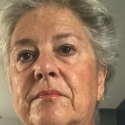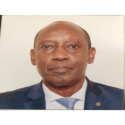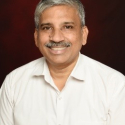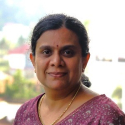
View courses by theme or by week
 Madhukar Pai, MD, PhD, FCAHS, FRSC
Madhukar Pai, MD, PhD, FCAHS, FRSC
Madhukar Pai is the Inaugural Chair of the Department of Global and Public Health at the McGill School of Population and Global Health. He holds a Tier 1 Canada Research Chair in Epidemiology & Global Health. He is the former Director of the McGill International TB Centre. He is Editor-In-Chief of PLOS Global Public Health. He is an elected Fellow of the Royal Society of Canada, and a Fellow of the Canadian Academy of Health Sciences.
Madhu Pai did his medical training and community medicine residency in Vellore, India. He completed his PhD in epidemiology at UC Berkeley, and a postdoctoral fellowship at the UCSF. Madhu serves on the WHO Strategic and Technical Advisory Group for TB in the South-East Asia Region, and the WHO Advisory group on Tuberculosis Diagnostics and Laboratory. He serves on the editorial boards of Lancet Infectious Diseases, PLoS Medicine, and BMJ Global Health, among others. He is Editor-In-Chief of PLOS Global Public Health.
Madhu’s research is mainly focused on improving the diagnosis and treatment of tuberculosis, especially in high-burden countries like India and South Africa. He has more than 500 publications. He is a recipient of the Union Scientific Prize, Chanchlani Global Health Research Award, Haile T. Debas Prize, and David Johnston Faculty & Staff Award.

Madhukar Pai, MD, PhD, FCAHS, FRSC is the Inaugural Chair of the Department of Global and Public Health at the McGill School of Population and Global Health. He holds a Tier 1 Canada Research Chair in Epidemiology & Global Health. He is the former Director of the McGill International TB Centre. He is Editor-In-Chief of PLOS Global Public Health. He is an elected Fellow of the Royal Society of Canada, and a Fellow of the Canadian Academy of Health Sciences.
Madhu Pai did his medical training and community medicine residency in Vellore, India. He completed his PhD in epidemiology at UC Berkeley, and a postdoctoral fellowship at the UCSF. Madhu serves on the WHO Strategic and Technical Advisory Group for TB in the South-East Asia Region, and the WHO Advisory group on Tuberculosis Diagnostics and Laboratory. He serves on the editorial boards of Lancet Infectious Diseases, PLoS Medicine, and BMJ Global Health, among others. He is Editor-In-Chief of PLOS Global Public Health.
Madhu’s research is mainly focused on improving the diagnosis and treatment of tuberculosis, especially in high-burden countries like India and South Africa. He has more than 500 publications. He is a recipient of the Union Scientific Prize, Chanchlani Global Health Research Award, Haile T. Debas Prize, and David Johnston Faculty & Staff Award.
 Mikashmi Kohli, PhD
Mikashmi Kohli, PhD
Mikashmi Kohli is a senior manager for Evidence Generation and Policy at FIND. She completed her PhD in Molecular Medicine from the All-India Institute of Medical Sciences, New Delhi, and did her postdoctoral fellowship at McGill University with the Pai Global TB group in Montreal, Canada. She has been working in the field of public health and for over 10 years now and has extensive training in evidence-based medicine. She has served on several WHO Guideline Development Group meetings developing Global Policy on diagnostics where she has supported evidence synthesis on new diagnostic tools using the GRADE process.
She has worked extensively with the Cochrane Infectious Disease group in Liverpool and has authored several Cochrane reviews and meta-analyses for TB diagnostics. All of these reviews have been used to inform policy recommendations for the Global TB programme at the WHO. She has also been leading the update of target product profiles for TB diagnostic tools.
She has led several projects related to accuracy of molecular TB diagnostics, and to assess the availability and accessibility of diagnostics in primary healthcare settings in low and-middle income countries. She is passionate about evidence-driven policies and implementation strategies for diagnostics in Global Health.
 Nitika Pant Pai, MD, MPH, PhD
Nitika Pant Pai, MD, MPH, PhD
Dr. Pai focuses on developing screening strategies for marginalized populations with point-of-care tests to improve screening and diagnosis, in order to make a public health impact. Her current work involves rapid point-of-care tests for HIV and related co-infections (hepatitis C, hepatitis B, syphilis) and the development of innovations that improve uptake of self testing for HIV, multiplex screening for HIV related co-infections for affected populations, and early screening for pregnant women in resource-limited settings. She is a Scientist at the RI-MUHC Infectious Diseases and Immunity in Global Health Program Centre for Outcomes Research and Evaluation and an Associate Professor in the Department of Medicine at McGill University.
 Petra Heitkamp, MSc, MPH
Petra Heitkamp, MSc, MPH
Petra is the Community Manager/Director of the TBPPM Learning Network, a dynamic online community of TB professionals fostering South-South learning in engaging private health providers in TB care and prevention at the primary care level, based at McGill University Health Center, Research Institute. Petra has over 25 years of global health experience with focus on applying effective collaborative approaches, strengthening health systems and community empowerment to advance public health and tackle infectious diseases. She has written multiple publications, taught courses and workshops, worked at the Stop TB Partnership and WHO/TB globally and at country level, forging partnerships among stakeholders from global agencies to grassroots tribal leaders.
 Vijayashree Yellappa, MBBS, MPH, FHM, PhD
Vijayashree Yellappa, MBBS, MPH, FHM, PhD
Dr. Vijayashree Yellappa is a medical doctor specialised in Public Health, with a fellowship in HIV medicine. Her PhD focused on the strategies to optimize the involvement of private practitioners in Tuberculosis (TB) care in India. She is currently working as Senior TB Consultant at KNCV, Hague and as Vice-Chair of the WHO TB PPM Core Group. She is the founding Chair of the TBPPM Learning Network India Chapter, in association with McGill University, Canada. She undertakes knowledge brokering with senior decision-makers and develops health system policy briefs for wider policy debate. She has carried out several multi-country implementation research projects combining both quantitative and qualitative analysis to produce empirical evidence to strengthen health systems.
 Charity Oga-Omenka, MPH, PhD
Charity Oga-Omenka, MPH, PhD
Dr. Charity Oga-Omenka is an Assistant Professor at the University of Waterloo's School of Public Health Sciences. With over 15 years of experience in public health, her research focuses on global health, healthcare access, and services, particularly concerning infectious diseases like tuberculosis, HIV, and COVID-19. She employs mixed methods research to explore the social determinants of health and health inequities, especially in resource-limited settings. Dr. Oga-Omenka has also researched the impact of COVID-19 on the private sector and on access to and quality of tuberculosis care in private healthcare settings in low- and middle-income countries.
 Leigh Raithby, MMASc
Leigh Raithby, MMASc
Leigh Raithby is a Senior Policy and Advocacy Officer at Results Canada, where her work focuses on building the political will to eliminate tuberculosis. Leigh is also part of the secretariat of Stop TB Canada, a network of individuals across Canada who are committed to ending tuberculosis at home and abroad. Prior to embarking on this work, Leigh completed a Bachelor of Health Sciences and a Master of Management of Applied Science in Global Health Systems at Western University.
 Lindsay Sheridan, MPACS
Lindsay Sheridan, MPACS
Lindsay Sheridan is the Manager of Advocacy at Results Canada and the Co-Chair of the Canadian International Education Policy Working Group. Results is a grassroots advocacy organization dedicated to the fight against extreme poverty.
 Alison Riddle, PhD
Alison Riddle, PhD
Alison is a Research Associate at the Bruyère Research Institute and a PhD candidate in the School of Epidemiology and Public Health at the University of Ottawa. Her research focuses on the intersection of gender and health, with an emphasis on women and adolescent girls’ health and well-being. Alison has over 25 years of experience in the fields of gender equality, women’s empowerment and global health. Most recently, she was a co-investigator for the Canadian Collaborative for Global Health co-lab, Improving Gender Equality and Nutrition Data for Women, Children and Adolescent Girls, and currently represents BRI as a founding member of the Canadian coalition behind the Gender Transformative Framework for Nutrition. In addition to her studies, Alison works as a Gender Equality and Global Health consultant with Gavi, the Center for Gender Equality at Stanford University, World Vision Canada, and Nutrition International.
 Yann Joly, Ph.D. (DCL), FCAHS, Ad.E.
Yann Joly, Ph.D. (DCL), FCAHS, Ad.E.
Yann Joly, Ph.D. (DCL), FCAHS, Ad.E. is the Director of the Centre of Genomics and Policy (CGP) at McGill University. He is a James McGill Professor at the Faculty of Medicine and Health Sciences, Department of Human Genetics. Prof. Joly is also an associate member of the Bioethics Unit and the Law Faculty at McGill. He was named advocatus emeritus by the Quebec Bar in 2012 and Fellow of the Canadian Academy of Health Sciences in 2017.
In 2021 he received, the Canadian Science Policy Centre, Science Policy Trailblazer Award. Prof. Joly is a member of the Canadian Commission for UNESCO (CCU) Sectoral Commission for Natural, Social and Human Sciences. He is the current Chair of the Bioethics Workgroup of the International Human Epigenome Consortium (IHEC) and Co-Leads the Regulatory and Ethics Work Stream of the Global Alliance for Genomics and Health (GA4GH). He was Chair (2017–2019) of the Ethics and Governance Committee of the International Cancer Genome Consortium (ICGC). He is also a member of the Human Genome Organization (HUGO) Committee on Ethics, Law, and Society (CELS).
Prof. Joly’s research interests lie at the interface of the fields of scientific knowledge, health law (biotechnology and other emerging health technologies) and bioethics. He created the first international genetic discrimination observatory (GDO) in 2018. He has published his findings in over 200 peer-reviewed articles featured in top legal, ethical and scientific journals. He served as a legal advisor on multiple research ethics committees in the public and private sectors. Prof. Joly also sits on editorial committees and acts as a reviewer for a wide range of publications in his field. In 2012, he received the Quebec Bar Award of Merit (Innovation) for his work on the right to privacy in the biomedical field.
 Diya Uberoi, PhD, JD, LLM, MPhil
Diya Uberoi, PhD, JD, LLM, MPhil
Diya Uberoi is a human rights scholar and advocate, with significant experience working with international and national organizations in the field of health and human rights. Her research interests lie at the intersection of law and public health, with a focus on access to medicines, genetic discrimination and equity in different emerging economies. She holds a PhD in International Law from the Graduate Institute for International and Development Studies, an LLM in Global Health Law from Georgetown Law Centre, a JD from Emory, and an MPhil in Psychology from the University of Cambridge.
Dr. Uberoi is the coordinator of the Genetic Discrimination Observatory and the Global Alliance for Genomics and Health (GA4GH) Policy Analyst at the Centre of Genomics and Policy at McGill.
 Janet Hatcher Roberts, BA, MSc
Janet Hatcher Roberts, BA, MSc
Janet Hatcher Roberts has over 30 years experience in bridging communities, evidence and policy both nationally and internationally. Currently, Janet is the Co-Director of the WHO Collaborating Centre on Knowledge Translation, Technology Assessment for Health Equity at Bruyere Research Institute, University of Ottawa. She is an Adjunct Assistant Professor in the Faculty of Medicine, School of Epidemiology and Public Health, at the University of Ottawa. Through her work at the WHOCC and the university she teaches courses on health systems and global governance and carries out research focussing on equity, health systems and global health.
From 1998-2013, she was the Executive Director of the Canadian Society for International Health) where she oversaw the design and implementation of global health systems strengthening projects in Africa, Asia, Latin and Central America and Eastern Europe finded by CIDA, IDRC,World Bank, WHO and PAHO. She served as the technical representative for PAHO in Canada from 1998-2002. She spent 2007-2008 in Geneva where she was Director of the Migration Health Department with the International Organization for Migration, now UN Migration.
In her volunteer time, Janet was the Chair of the Board for Action Canada for Population Development and was a Board member and Past Treasurer of the Canadian Coalition for Global Health Research. She was a Board member of the US-based Council of Graduate Foreign Nurses (CGFNS)from 2007- 2016 . From 2009-2019, she was appointed by an Order in Council as Board member to Public Heath Ontario (PHO) where she also sat on the Strategic Planning Committee and Governance Committee. From 2018 to 2020, she has served as an ex-officio member and now board member of the Ottawa Centre Liberal EDA. She also served for four years on the National Board of Make Poverty History. Since January 2021 she has served as a member of the Advisory Committee for the newly formed Pegasus Institute and is a member of the newly formed Transition committee for the new Canadian Association for Global Health, an amalgamation of the Canadian Society for International Health and the Canadian Coalition for Global Health Research.
 Innocent Ntaganira, MD, MSc, MA
Innocent Ntaganira, MD, MSc, MA
Dr. Innocent Ntaganira is a public Health expert with more than 38 years of professional experience including 19 years with the World Health Organization (WHO). He retired from the WHO at the end of June 2021, the last position being that of WHO Representative to the African Union (AU) and the United Nations Economic Commission for Africa (UNECA), working on facilitating engagement between the WHO, the two organizations and other continental bodies to advance the health agenda in Africa. The professional journey took him through various levels of public health system governance, from primary health care service delivery to central policy making and across several African countries.
Dr Ntaganira is an alumni of the University of London (MA in Global Diplomacy), Université Laval (MSc in Epidemiology) and Université du Burundi (MD). Other short term academic trainings include seminars with John Hopkins University (USA), Université Libre de Bruxelles (ULB), University of East Anglia, Norwich (UK) and the Graduate Institute of International Studies and Development (Switzerland).
 Srikanth Kondreddy, PhD
Srikanth Kondreddy, PhD
Dr. Srikanth Kondreddy trained in global health policy, governance, and diplomacy. He has over 15 years of experience working with the Government of Canada, United Nations agencies, Global Health Thinktanks and Academia. He is a Founding member and Vice-president of Policy and Research with UrbanHealth360, a Non-profit organization based in the USA.
Currently, he works for the World Health Organization, Geneva. In addition, he is an Adjunct Professor at the School of Epidemiology and Public Health, University of Ottawa, an investigator at Bruyere Research Institute and a Senior Fellow at the WHO Collaborating Centre for Knowledge Translation and Health Technology Assessment in Health Equity, Ottawa, Canada.
He contributes to global health policy discussions and is a member of various policy engagement networks, including the Think 20 - a policy engagement group of the G20. He was an Indian Council of Medical Research Fellow and a J N Tata Scholar. He also received awards from the Canadian Society for International Health, Eastern Sociological Society, International AIDS Society, and University Grants Commission. In addition, he received research grants from the Canadian Institutes of Health Research, the Swiss Network for International Studies, Worldwide Universities Network, Global One Health Network and JN Tata Endowment. He has published in high-impact global health and health policy journals. He holds a PhD from the National AIDS Research Institute/the University of Pune (India), Post-doctoral Fellowships/Training from McGill University (Canada) and the Graduate Institute of International and Development Studies (Switzerland).
 Tracie A. Barnett, PhD
Tracie A. Barnett, PhD
Tracie Barnett is an Associate professor in the Department of Family Medicine, and researcher at the CHU Sainte-Justine Research Centre. She is the scientific co-director of the QC Unité de Soutien SSA (McGill Axis: Valorisation des Données) and co-director of the McGill Patient-Partnership antenna. She is also co-director of the FRQ-S CMDO (Cardiometabolic health, Diabetes and Obesity) Network. With expertise in epidemiology and health promotion, her research explores the natural history of cardiometabolic health and related behaviors. She focuses on the impact of the built environment and personal social networks on non-communicable diseases (NCDs). Her work involves creating meaningful indicators within activity spaces and social environments, monitoring their evolution over time, and identifying targets for intervention. Additionally, she collaborates with clinical and patient partners to co-develop and implement health promotion strategies in under-resourced settings.
 Jennifer Ronholm, BSc, PhD
Jennifer Ronholm, BSc, PhD
Jennifer is the Director of the One Health Against Pathogens (OHAP) NSERC training program which provides funding and supplementary training in Communication and Public Policy Development to graduate students in microbiology programs. Her research focuses on improving the health of domesticated livestock while reducing agricultural reliance on antibiotics through optimizing the microbiota of the livestock. She has written multiple publications, taught several courses and workshops, and has forged several relationships with government agencies - all with a One Health focus.
 Amrita Daftary, PhD, MPH
Amrita Daftary, PhD, MPH
Dr. Daftary is a social and behavioural health scientist. Her research examines health care seeking and caregiving practices for HIV and TB to inform the design and evaluation of multi-level interventions. Dr. Daftary has expertise in qualitative research methods, global implementation science, and health services research. She is well cited for her work on stigma associated with TB, including drug-resistant TB and TB-HIV coinfection. She works in sub-Saharan Africa, particularly South Africa, and India and Canada. She is an Associate Professor in the School of Health Policy & Management, in the Faculty of Health at York University. Dr. Daftary holds adjunct positions at the University of Toronto and Centre for the AIDS Programme of Research in South Africa (CAPRISA), University of KwaZulu Natal. Her early training was in pharmacy.
 Nora Engel, PhD
Nora Engel, PhD
Dr. Engel is associate professor of Global Health at Maastricht University. Her research focuses on innovation dynamics in global health challenges (mainly tuberculosis and HIV/AIDS) and on the sociology of diagnostics and innovations at the point-of-care. She has done extensive qualitative fieldwork in India and South Africa, among others on challenges to point of care testing across different settings, diseases and actor groups. She is a contributor on qualitative research to the advanced TB diagnostics course since 2012 and together with Amrita Daftary successfully launched the qualitative methods course in 2017.
 Madhukar Pai, MD, PhD, FCAHS, FRSC
Madhukar Pai, MD, PhD, FCAHS, FRSC
Dr. Pai is the Inaugural Chair of the Department of Global and Public Health at the McGill School of Population and Global Health. He holds a Tier 1 Canada Research Chair in Epidemiology & Global Health. He is the former Director of the McGill International TB Centre. He is Editor-In-Chief of PLOS Global Public Health. He is an elected Fellow of the Royal Society of Canada, and a Fellow of the Canadian Academy of Health Sciences.
Madhu Pai did his medical training and community medicine residency in Vellore, India. He completed his PhD in epidemiology at UC Berkeley, and a postdoctoral fellowship at the UCSF. Madhu serves on the WHO Strategic and Technical Advisory Group for TB in the South-East Asia Region, and the WHO Advisory group on Tuberculosis Diagnostics and Laboratory. He serves on the editorial boards of Lancet Infectious Diseases, PLoS Medicine, and BMJ Global Health, among others.
 Shashika Bandara, MScGH, PhD
Shashika Bandara, MScGH, PhD
Shashika Bandara is a post-doctoral fellow at the Department of Global Public Health in the School of Population and Global Health at McGill University. He co-leads McGill University’s research on policy exemplars addressing structural discrimination to improve health in collaboration with the O’Neill-Lancet Commission on Racism, Structural Discrimination and Global Health. His research and advocacy focus on global health policy and governance. His Ph.D. examined the global health treaty, the Framework Convention on Tobacco Control implementation in low- and middle-income countries.
Shashika holds a masters in global health from Duke University and is formerly a policy associate at the Center for Policy Impact in Global Health at the Duke Global Health Institute. He completed his doctoral studies at McGill University. Shashika has worked in human rights policy advocacy in Sri Lanka and South Asia with Law and Society Trust and in collaboration with Forum Asia. He has experience working in humanitarian settings with CARE International. His initial training was in molecular biology and has conducted cancer immunology research at Johns Hopkins University.
 Anurag Bhargava, MD, MSc.
Anurag Bhargava, MD, MSc.
Dr. Bhargava is currently a Professor in the department of Internal Medicine at Yenepoya Medical College, Mangalore and also associated with the Center for Nutrition Studies, Yenepoya University. He has worked on the interface of clinical medicine and public health in diverse settings across India, including as a rural physician for 10 years. He serves on advisory committees for organisations like the National TB Elimination Programme, WHO SEAR, WHO Geneva. He too has been involved in the RATIONS trial for the past 4 years.

Madhavi Bhargava, MD
Dr. Bhargava is currently an Associate Professor in the department of Community Medicine at the Yenepoya Medical College in Mangalore, and associated with the Center of Nutrition Studies, at Yenepoya University. Madhavi worked initially as a primary care physician and surgeon in rural central India for 10 years, and later trained in public health and research. She is passionate about teaching under-graduate and post-graduate students. She has been involved in the large RATIONS trial of nutritional support to reduce TB incidence in India.
 Johnathon Campbell, PhD
Johnathon Campbell, PhD
Jonathon Campbell is an Assistant Professor in the Departments of Medicine and Global and Public Health at McGill University, Associate Director of the McGill International TB Centre, and a Junior Scientist at the RI-MUHC. His expertise is in economic evaluation and epidemiology, with a research focus in tuberculosis. His overall program of research is focused on generating evidence to inform the design, cost, and implementation of interventions and programs supporting tuberculosis prevention and its elimination. His work has informed World Health Organization and Canadian tuberculosis guidelines.
 Sapha Barkati, MD, MSc, FRCPC, DTM&H, CTropMed
Sapha Barkati, MD, MSc, FRCPC, DTM&H, CTropMedDr. Sapha Barkati is an Associate Professor and the training program director of Infectious diseases and Medical Microbiology at McGill University. She completed a master’s degree in virology at Université de Montréal and a postdoctoral fellowship in tropical medicine and parasitology at McGill University. Dr Barkati is the associate director-education of the J.D MacLean Centre for Tropical and Geographic Medicine at McGill University and the director of this site within the GeoSentinel network. Since 2018, she has become an established international faculty of the Gorgas Diploma Course, Instituto De Medicina Tropical “Alexander Von Humboldt” at Universidad Peruana Cayetano Heredia in Lima, Peru. She is the chair of the ISTM Migration and Refugee Interest Group Council. Her main interest is the epidemiology of tropical and parasitic diseases in vulnerable individuals, migrants and immunocompromised hosts.
 Michael Libman, MD, FRCPC
Michael Libman, MD, FRCPC
Dr. Libman is the former Director of the JD MacLean Centre for Tropical Diseases at the McGill University Health Centre (MUHC), a Consulting Microbiologist for the region of Nunavik and Professor of Medicine at McGill University. Dr. Michael Libman has expertise in many areas of infectious diseases and microbiology. His research involves infections acquired by travelers and immigrants, as well as diseases which are particularly problematic in the Canadian far north. Dr. Libman holds leadership positions in a number of professional societies, including the Association of Medical Microbiology and Infectious Diseases of Canada, the American Society for Tropical Medicine and Hygiene, and the International Society of Travel Medicine. He is also involved in the field of infection prevention and control in the health care setting.
 Cedric Yansouni, MD, FRCPC, DTM&H
Cedric Yansouni, MD, FRCPC, DTM&H
Cedric Yansouni is Associate Professor of Infectious Diseases and Medical Microbiology at the McGill University Health Centre in Montreal, and Director of the J.D. MacLean Centre for Tropical and Geographic Medicine at McGill. His research programme is focused on informing policy on diagnostics, via the development and field-validation of diagnostic tools for infections in low-resource and remote settings, including remote Indigenous communities in Canada. He advises several governmental bodies on diagnostics (WHO, Public Health Agency of Canada) and holds a Clinician-Scholar Career Award from the FRQS.